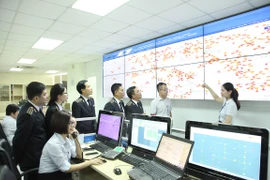Hanoi (VNA) – The State Audit of Vietnam (SAV) hasbolstered the application of information technology (IT) in its activities, as18 types of auditing software have come into use and remote audits are on thehorizon, Auditor General Ho Duc Phoc said on January 5.
He made the statement during a SAV conference inHanoi to launch tasks in 2021, attended by Vice Chairman of the NationalAssembly (NA) Phung Quoc Hien.
In his remarks, Hien spoke highly of the effortsof the SAV last year against a backdrop of COVID-19, calling on it to promptly implementthe strategy for audit development to 2030 and the State Audit Law.
He also urged the auditing sector to promote theapplication of IT, raise the capacity of auditors, and closely work withrelevant agencies and foreign partners.
The SAV is projected to conduct 181 audits this yearwhile continuing with administrative reform and IT application to raiseefficiency.
It will also further bolster internationalcooperation and integration to affirm its role and position in the region andthe world, especially as Chair of the Asian Organisation of Supreme AuditInstitutions (ASOSAI) for the 2018-2021 term.
In addition to major audit cases at home, it isalso working with other countries in a cooperative environmental audit on watermanagement in the Mekong River basin, Phoc added.
The SAV handled 174 cases last year and completeda report of audit results in 2019. It also suggested the NA and the Governmentamend, remove, or replace 198 documents out of tune with regulations orreality, in a bid to prevent losses and curb waste.
As of the end of 2020, SAV had proposed settlementof irregularities involving an estimated 60.03 trillion VND (about 2.6 billionUSD) during the year and detected five violation cases that were transferred tocompetent agencies for legal action.
It also provided relevant agencies with 131 dossiersto serve inspection, investigation, and supervision work, as well asinformation for meetings of the Government, the NA, and agencies.
The law revising and supplementing some articles of the Law on State Audit was approved at the 8th session of the 14th National Assembly, allowing the SAV to access the national database and electronic data systems of audited entities as well as agencies, organisations, and individuals related to auditing activities.
This makes it easier for audit agencies to collect information and documents related to the content and scope of audits.
It is expected to help the sector realise its goal of reducing the number of personnel conducting auditing activities and shortening the audit duration and time working directly at audited agencies, contributing to making the task more transparent and precise.
The Strategy for the Development of State Audit in the 2020-2030 Period with a Vision to 2035 focuses on professional audit training to create qualified auditors with professional ethics and the ability to use advanced technologies in auditing activities in the digital age.
SAV’s auditors have applied software in the audit of land planning and management in urban areas, which were complicated, as well as in compensation and support for resettlement when implementing projects.
For example, Global Mapper and Map Tiler software helped auditors read and analyse numerical data on land use planning maps, determine boundaries of land plots, and establish the actual land status compared with land use planning. Both software have helped save time and increase accuracy.
The SAV has digitalised a large volume of records from more than 500 audits conducted in 2017, 2018, and 2019, with approximately 9 million pages being digitised, classified, and stored in the electronic form.
IT application in audit activities also reflects the SAV’s pioneering role in its capacity as the Chair of the Asian Organisation of Supreme Audit Institutions (ASOSAI) for the 2018-2021 tenure. Apart from directing ASOSAI’s activities, the SAV has gradually affirmed its position with international audit organisations and ASOSAI members in terms of reform conducted via specific commitments and actions.
One goal set for the 2026-2030 period is to conduct regular annual audits of budget balances at ministries, centrally-run agencies, provinces, and centrally-run cities. Audits of operations, specialised audits, information technology audits, and audits of the environment will be promoted, with these to account for 30-40 percent of all audits each year. Attention will also be paid to detecting loopholes in mechanisms, policies, and laws./.































